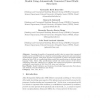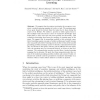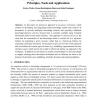414 search results - page 54 / 83 » Background knowledge for ontology construction |
119
click to vote
ISMIS
2009
Springer
15 years 8 months ago
2009
Springer
Abstract. A multi-relational clustering method is presented which can be applied to complex knowledge bases storing resources expressed in the standard Semantic Web languages. It a...
146
click to vote
BMCBI
2010
15 years 2 months ago
2010
Background: Modern high throughput experimental techniques such as DNA microarrays often result in large lists of genes. Computational biology tools such as clustering are then us...
141
click to vote
JUCS
2010
14 years 8 months ago
2010
: Assessing the quality of conceptual models is key to ensure that conceptual models can be used effectively as a basis for understanding, agreement and construction of information...
129
click to vote
EELC
2006
15 years 5 months ago
2006
Abstract. We suggest that the primary motivation for an agent to construct a symbol-meaning mapping is to solve a task. The meaning space of an agent should be derived from the tas...
IJMMS
2000
15 years 1 months ago
2000
In this paper we present an approach to document enrichment, which consists of developing and integrating formal knowledge models with archives of documents, to provide intelligent...



